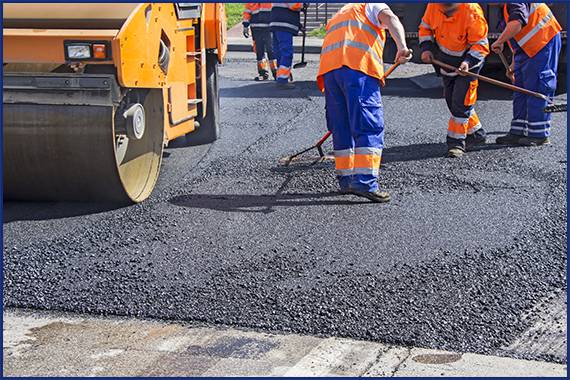Transform Your Space with Reliable Paving Service
Transform Your Space with Reliable Paving Service
Blog Article
Checking Out the Various Kinds Of Asphalt Paving and Their Advantages
The landscape of asphalt paving includes a range of types, each engineered to deal with particular requirements and ecological considerations. From the durable features of Hot Mix Asphalt to the environmentally friendly attributes of Recycled Asphalt Sidewalk, comprehending these alternatives can substantially influence task outcomes. Furthermore, advancements such as Warm Mix Asphalt and Porous Asphalt present additional layers of performance and sustainability. As we check out these various paving options, the nuanced benefits they provide might surprise you and possibly modify your method to future paving tasks.
Warm Mix Asphalt
When considering the most reliable leading solutions, hot mix asphalt (HMA) sticks out as a top selection for many applications (paving). HMA is a flexible leading product recognized for its durability, flexibility, and general performance. It is created by home heating asphalt binder and incorporating it with accumulations at high temperature levels, guaranteeing a consistent blend that can hold up against numerous ecological conditions
Among the primary benefits of HMA is its capacity to give a smooth, skid-resistant surface area, improving safety for lorries and pedestrians alike. Additionally, HMA displays excellent resistance to deformation, making it optimal for high-traffic areas such as freeways and car park. Its adaptability to different environments better adds to its extensive use.
The installation procedure of HMA is reasonably fast, enabling for efficient task conclusion with very little disruption to traffic. In addition, it can be reused, minimizing waste and promoting sustainability within the building and construction sector. Generally, hot mix asphalt continues to be a top choice for leading experts due to its durable performance characteristics and long-lasting cost-effectiveness, making it a reputable solution for numerous infrastructure demands
Warm Mix Asphalt
Warm mix asphalt (WMA) provides a cutting-edge option to hot mix asphalt, providing comparable benefits while needing reduced production temperature levels. Usually produced at temperatures in between 190 ° F and 250 ° F, WMA technology lowers energy usage and greenhouse gas exhausts during production, making it an extra eco-friendly alternative.
This versatility can lead to enhanced compaction and total longevity of the asphalt surface area. Additionally, WMA can be used in various applications, ranging from highways to domestic driveways, without jeopardizing performance.

The consolidation of additives or modified binders in WMA adds to its improved residential properties, guaranteeing that it meets or surpasses performance criteria. WMA's lowered thermal effect throughout production can lower the possibility of damages to the surrounding important link atmosphere, making it an enticing option for lasting paving practices.
Cold Mix Asphalt
Cold mix asphalt is a flexible leading remedy typically utilized for short-lived repairs and low-traffic areas. This kind of asphalt is created at ambient temperature levels, making it a hassle-free selection for fast fixes and projects where conventional hot mix asphalt may not be practical. The blend commonly contains asphalt binder, aggregate, and additives, allowing it to remain workable for an extended period.
Among the main benefits of cold mix asphalt is its convenience of application. It can be installed without specific equipment, making it accessible for smaller service providers and do it yourself fanatics. In addition, chilly mix can be applied in different weather condition conditions, which is particularly advantageous for immediate fixing demands.

It may not supply the very same long-term sturdiness as warm mix asphalt, its fast application and flexibility make it an excellent option for momentary remedies and low-traffic applications. Overall, cold mix asphalt remains a useful choice in the asphalt paving landscape.
(navigate here)
Porous Asphalt
Porous asphalt is an innovative paving service developed to improve stormwater administration and minimize surface overflow. This type of asphalt features a distinct structure that incorporates interconnected voids, allowing water to permeate via the surface area and right into the underlying layers. By assisting in all-natural drain, porous asphalt helps mitigate the threat of flooding and decreases the burden on local stormwater systems.
One of the main benefits of porous asphalt is its capacity to enhance water top quality. As stormwater filters with the sidewalk, contaminants and debris are trapped, minimizing the number of pollutants that get in regional rivers. This contributes to much healthier ecosystems and supports conformity with environmental policies.
In addition, porous asphalt can improve the long life of the pavement itself. By minimizing water buildup on the surface, it lessens the possibility for freeze-thaw cycles that can result in splitting and deterioration. The minimized demand for traditional stormwater management facilities can result in expense financial savings for districts and developers.
Recycled Asphalt Pavement
(see what’s next)Recycled asphalt pavement (RAP) stands for a sustainable method to road building and construction and maintenance that profits both the setting and the economic climate. By recycling existing asphalt products, RAP lowers the demand for new raw materials, which consequently saves all-natural sources and minimizes environmental impact. This method reduces power usage and greenhouse gas exhausts linked with the manufacturing of brand-new asphalt.
The unification of RAP right into brand-new sidewalk mixtures can also lead to significant cost savings. Professionals can take advantage of recycled materials to decrease general project expenses, making it an economically viable option for municipalities and private developers alike. Additionally, RAP offers equivalent efficiency attributes to virgin asphalt, making sure toughness and long life in road surfaces.
RAP's versatility allows it to be made use of in different applications, including highways, parking whole lots, and household driveways. By improving the structural integrity of existing sidewalks, RAP contributes to improved safety and security and level of smoothness of streets.
Conclusion
Hot Mix Asphalt succeeds in resilience and quick installation for high-traffic locations, while Cozy Mix Asphalt enhances sustainability with decreased power intake. Cold Mix Asphalt serves as an affordable option for immediate fixings, Porous Asphalt successfully manages stormwater, and Recycled Asphalt Pavement advertises ecological responsibility.
Report this page